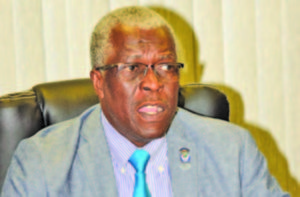Following criticisms over its response to several air transit accidents, the Guyana Civil Aviation Authority (GCAA) is now moving to expand its technical staff to include qualified and experienced Flight Operations Inspectors. This is slated to ensure that the aviation industry “complies with the highest possible safety standards”.

Authority Head, Egbert Field
The Aircraft Owners’ Association of Guyana (AOAG) on Wednesday noted that it is in full support of GCAA’s move to expand its staff which was recently announced by the Director General of the aviation body, Egbert Field. The proposed staff increase is included in the Authority’s budget for 2018. The Aircraft Owners’ Association of Guyana stated that this upgrade will meet the needs of a rapidly growing aviation industry and its expanding hinterland shuttle operations.
“The Association, for many years, has advocated in favour of strengthening the Authority’s regulatory and technical capacity in order that Guyana meet the requirements of the International Civil Aviation Organisation (ICAO),” AOAG noted on Wednesday.
The AOAG however stressed that it has long emphasised the dangerous prevailing conditions under which airline pilots fly in delivering essential services to hinterland locations. The body reminded that it has been urging the GCAA and Government to address the need to “upgrade our hinterland aerodromes and invest in an adequate Search and Rescue system appropriate to our domestic aviation requirements”.
The Association noted that many hinterland airstrips “still fail to meet the regulatory standards” that have been set by the GCAA with regards to aircraft tracking systems such as Automatic Dependent Surveillance Broadcast (ADSB). AOAG reminded that the ADSB system still remains to be fully operational.
“It is because of the frequently hostile and extremely dangerous conditions under which aircraft operators conduct hinterland shuttle flights from hinterland locations that the Director of Civil Aviation has quite properly demanded operators manage these away from base operations to a standard specifically developed to ensure maximum possible safety,” the body stressed.
The AOAG said its Technical Committee has worked with its members to develop procedures and requirements specific to the environment in which shuttle operations are conducted, adding that it had presented the Standard Operating Procedures on August 31 which were accepted by the GCAA.
On July 25, Captain Collin Martin, a retired Guyana Defence Force Major, was piloting a Roraima Airways’ Britten-Norman Islander aircraft when it crashed on landing at Eteringbang, killing him almost instantly. Captain Imran Khan, 41, of Essequibo Coast, Region Two, also lost his life when the Air Services Limited’s Cessna 206 aircraft he was flying from Chi-Chi to Mahdia went down late last month.
The GCAA Head had conceded earlier this month that at present, Guyana does not have an adequate search-and-rescue helicopter, nor was there navigational aid at the main airport outside a certain radius. Field reasoned that this was a risky situation which was ongoing for years without rectification. As such, he made commitments to ensure the sector would see improvements, having noted that our pilots fly unassisted through vast airspace beyond the 75-mile airport radius, while depending primarily on their own radio contact with other planes in order to avoid mid-air collisions.



